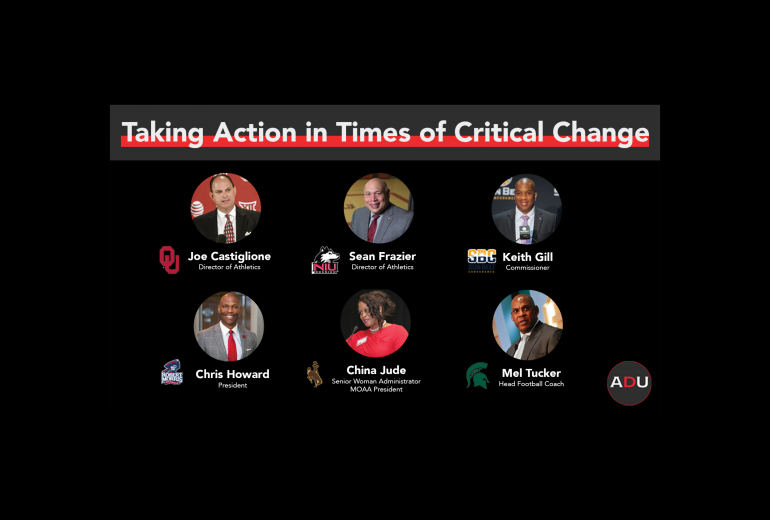College Sports Facilities
Listening to Learn

On June 12, I had the opportunity to facilitate an important conversation among six esteemed professionals in the collegiate world. Athletic Director U invited me to moderate the virtual event that included athletic directors, coaches, a university president and a conference commissioner.
The “town hall” discussion was entitled “Taking Action in Times of Critical Change” and was organized in response to the groundswell of attention to the racial climate in our country.
The panelists were:
Joe Castiglione, Director of Athletics at the University of Oklahoma
Sean Frazier, Director of Athletics at Northern Illinois University
China Jude, Senior Assoc. AD/SWA at University of Wyoming
Keith Gill, Sun Belt Conference Commissioner
Chris Howard, President of Robert Morris University
Mel Tucker, Head Football Coach at Michigan State University
My responsibility in the session was to moderate the conversation and pose questions to the panelists. My job was to listen. I was honored to listen…and to learn.
I was moved by what I heard. I was moved by the panelists’ passion….and their compassion. I was moved by the fight for justice that burns in their gut. And I was moved by their perseverance.
As they pointed out to our audience, this is not a “new” topic for any person of color in America.
The virtual panel organizers at ADU were intentional when planning this event to ensure that the audience learned some best practices that they can implement NOW in their athletic and academic programs.
Our panel discussion lasted two hours and could have gone on for two more. I wanted to share some of the wisdom I took away from that day in hopes that you are moved as well. I encourage all of us to listen and learn from one another.
-Acknowledge that this is a marathon and not a sprint. This is not a passing situation; it is not going away. This is a time for education, discussion and action, not just rhetoric.
-Create a safe environment for students and athletes to have open and difficult conversations.
-Offer a program like “Mini Stories Matter” — originally created by an international student who wanted a non judgmental space for students to talk about a variety of issues like stereotypes and respect.
-Offer educational programs and invite alumni and alumni athletes to speak about their experiences as students facing racial tension and discrimination.
-It is important for students to see that there is an “invitation” from the top down to have important conversations. Provide a safe space for students to be able to express how they feel without having to hold back for fear of backlash or feeling like what they’ve said will be used against them later.
-Leaders must be willing to call it what it is. You have to be authentic and be willing to have real conversations.
-Administrators and coaches need to show support. The university must offer a shared vision across departments and programs.
-Create continuing education opportunities for administrators and staff.
-Don’t use the excuse that you “don’t know where to start” to avoid starting something.
-Offer a Diversity Integration Group so that students can help coaches and administrators understand what it is like for them as young adults. Make it a cross-section of all ages and offer programming and a curriculum.
-Form a “Bridge Builder” forum for student athletes of color to address shortcomings and opportunities for improvement in athletic departments.
-Collaborate with another university to offer “Humanity Talks” where students can have raw conversations with one another and invite coaches and faculty to attend only to listen.
-There is no room for silence. Don’t wait for someone else to start the conversation or for the locker room to sort it out.
-Don’t create a one-time mandatory program and expect that to be the end of it.
-Don’t set up a committee and stop there. Students are quick to spot “airbrushed” statements that are not supported by long-term solutions.
-Don’t counteract “Black Lives Matters” statements by trying to explain why the system is the way it is. It jeopardizes the sense of creating a safe space to engage.
-Speak your own vulnerability, insecurities, lack of knowledge and ask for education.
-Simply ask, “How can I support you?”
-Bring in state and local government and law enforcement to educate students and faculty on the fundamentals of our systems.
-Specifically bring in local police to talk with your students so they can hear their motivations and why they chose law enforcement for a profession.
-Be aware of microaggressions and statements like, “I don’t see color; I treat everyone the same.” That communicates that you do not see that person as an individual.
-Take semantic responsibility. Be educated and informed before you speak. Beware of using the term empathy if you are a white person relating to a person of color. There is a sense that you truly cannot walk in another’s shoes if you have a different skin color.
-Utilize your university’s chief diversity offices and tap into their resources. Take advantage of prevention programs.
-Resource coaches with civil rights educational opportunities. For example, if you’re on the road in the South, take teams to visit sites like the Civil Rights Museum in Montgomery, and the Dr. King and Rosa Parks museums.
-If you are a white head coach or administrator with assistants who are people of color, ask them how their students perceive you. What are recruits’ perceptions of you based on statements or social media posts?
-Suggested reading: “White Fragility” by Robin Diangelo
While this summary does not cover everything we discussed, it is a great place to begin and continue the conversation. Watch ADU’s recording of our town hall meeting on their website at: https://www.athleticdirectoru.com/video/taking-action-in-times-of-critical-change/